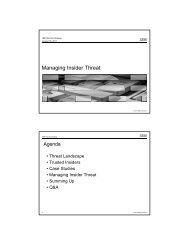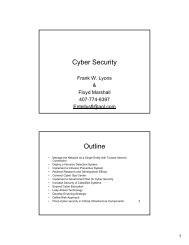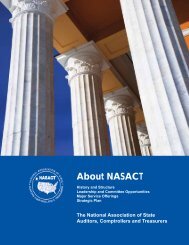Advisory Committee on Tax Exempt and Government Entities (ACT ...
Advisory Committee on Tax Exempt and Government Entities (ACT ...
Advisory Committee on Tax Exempt and Government Entities (ACT ...
You also want an ePaper? Increase the reach of your titles
YUMPU automatically turns print PDFs into web optimized ePapers that Google loves.
The Appropriate Role Of The Internal Revenue Service With Respect To <strong>Tax</strong>-<strong>Exempt</strong> Organizati<strong>on</strong> Good Governance IssuesThese c<strong>on</strong>cerns should be c<strong>on</strong>sidered by the IRS in any instance in which the IRSinquiries or opines about matters of n<strong>on</strong>profit governance. However, the inherent risks<strong>and</strong> the need for cauti<strong>on</strong> are not of equal sensitivity in all circumstances. Therefore, weoffer a framework <strong>and</strong> recommendati<strong>on</strong>s that take these c<strong>on</strong>cerns into account in ourc<strong>on</strong>siderati<strong>on</strong> of the appropriate role of the IRS with respect to n<strong>on</strong>profit governance.IX. Recommendati<strong>on</strong>sWe begin our recommendati<strong>on</strong>s by again acknowledging the IRS’s l<strong>on</strong>gst<strong>and</strong>ing stake<strong>and</strong> legitimate interest in governance issues as they relate directly to compliance withthe laws under its jurisdicti<strong>on</strong>. As we stated in the introducti<strong>on</strong>, the IRS’s view that “awell-governed charity is more likely to obey the tax laws, safeguard charitable assets,<strong>and</strong> serve charitable interests than <strong>on</strong>e with poor or lax governance” 140 seems selfevident.But efforts to promote good governance are fraught with complexity. While wemay all agree that governance matters, the empirical evidence does not support thepropositi<strong>on</strong> that requiring specific governance practices results in greater compliancewith the tax laws. Effective governance likely is much more a questi<strong>on</strong> of the attitude ofresp<strong>on</strong>sibility <strong>and</strong> accountability of those in charge than the adopti<strong>on</strong> of specific policies<strong>and</strong> practices. Given the diversity of the sector <strong>and</strong> the varying, <strong>and</strong> oftenunpredictable, challenges facing an organizati<strong>on</strong>, the organizati<strong>on</strong>’s governing boardgenerally is in the best positi<strong>on</strong> to determine what the most appropriate practices are forits organizati<strong>on</strong>. We are very mindful of the fact that even the most modest level ofprescripti<strong>on</strong> from a regulatory body such as the IRS regarding what c<strong>on</strong>stitutes “good”governance can undermine the fundamental <strong>and</strong> wholly legitimate authority of theorganizati<strong>on</strong>’s governing board <strong>and</strong> can suggest a <strong>on</strong>e-size-fits-all approach that canplace undue burdens <strong>on</strong> an organizati<strong>on</strong>, divert the organizati<strong>on</strong>’s attenti<strong>on</strong> frommeaningful governance to polices <strong>and</strong> procedures, <strong>and</strong> do damage to the uniquelydiverse <strong>and</strong> vibrant charitable sector in this country.Accordingly, we believe that the IRS should approach the governance area with cauti<strong>on</strong>.We recommend that in each instance the IRS is c<strong>on</strong>sidering involvement in a specificgovernance issue it should c<strong>on</strong>sider the importance of the specific governance practiceto compliance with the laws under its jurisdicti<strong>on</strong> <strong>and</strong> then balance that against potentialcountervailing c<strong>on</strong>siderati<strong>on</strong>s (e.g., will it elicit or promote a meaningful resp<strong>on</strong>serelated to tax compliance <strong>and</strong> what harm might flow) in determining whether to proceed.We believe the c<strong>on</strong>text in which the IRS is operating—in creating st<strong>and</strong>ards forexempti<strong>on</strong>; <strong>on</strong> determinati<strong>on</strong> of exempti<strong>on</strong>; <strong>on</strong> examinati<strong>on</strong> or in other complianceinitiatives; in 990 reporting; <strong>and</strong> in educati<strong>on</strong> <strong>and</strong> outreach—is relevant to this balancing.We c<strong>on</strong>clude our report with 12 recommendati<strong>on</strong>s we hope the IRS will find useful as aframework in helping it navigate appropriately between its m<strong>and</strong>ate to ensurecompliance with the tax laws <strong>and</strong> the broader <strong>and</strong> more aspirati<strong>on</strong>al goal of promotinggood governance in the sector. We recognize that in a number of instances the IRSalready follows or substantially follows these recommendati<strong>on</strong>s, but we include all 12 toensure a complete framework.140Governance <strong>and</strong> Related Topics – 501(c)(3) Organizati<strong>on</strong>s, supra note 22, at Preface.ADVISORY COMMITTEE ON TAX EXEMPT AND GOVERNMENT ENTITIES (<strong>ACT</strong>) June 11, 2008 46













